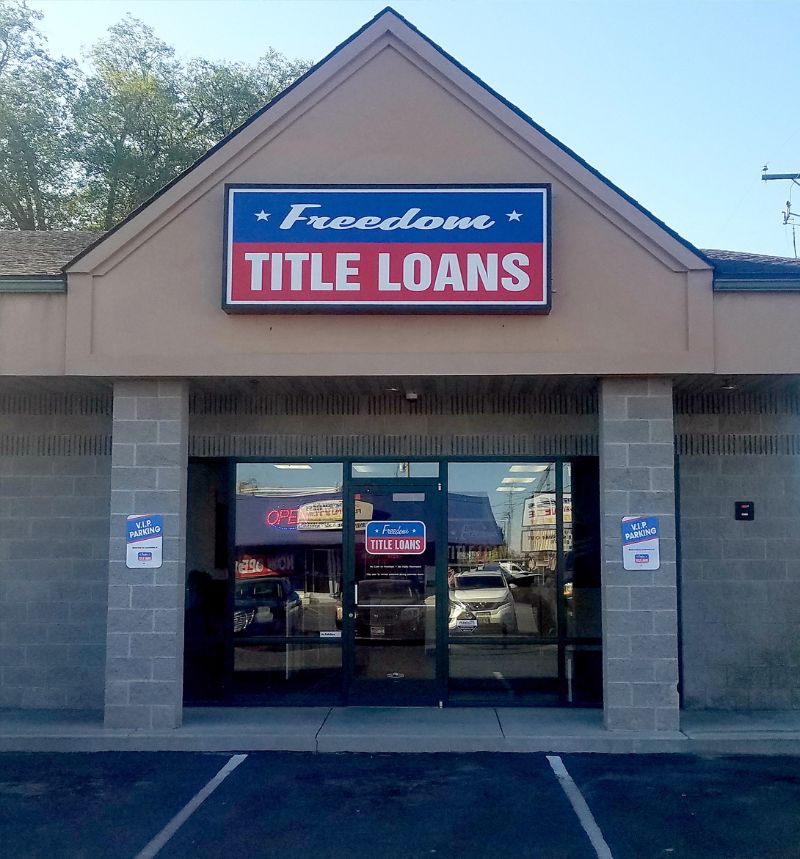When you’re facing an unexpected expense or emergency, understanding what is the interest rate on a title loan can make the difference between a manageable short-term solution and a financial challenge. At Freedom Title Loans, we believe in transparency from the start—because you deserve to know exactly what you’re signing up for before you borrow.
Title loan interest rates can vary significantly depending on where you live, the lender you choose, and several other factors. Whether you’re in Boise, Nampa, or anywhere in Idaho’s Treasure Valley, this guide will help you understand how title loan interest works, what rates you can expect, and how to make an informed decision that’s right for your situation.
Understanding How Title Loan Interest Works
Title loans are short-term secured loans where your vehicle’s title serves as collateral. Unlike traditional bank loans that focus heavily on credit scores, title loans in Boise and Nampa primarily consider your vehicle’s value and your ability to repay. To learn more about the basics, visit our guide on how car title loans work.
Interest on title loans is typically calculated as a monthly finance charge—a percentage of your loan amount charged each month. According to the Consumer Financial Protection Bureau¹, this monthly rate, when annualized, becomes your Annual Percentage Rate (APR), which provides a more accurate picture of your total borrowing cost.
Here’s a simple example: If you borrow $1,000 with a 25% monthly finance charge, you’d owe $250 in interest for that month. Annualized, this equals approximately 300% APR. While this number may seem different compared to traditional bank loans, it reflects the short-term nature of title lending and the reduced emphasis on credit checks.
What Is the Average Interest Rate on a Title Loan?
The average interest rate for title loans nationwide is approximately 300% APR, according to research from The Pew Charitable Trusts². However, rates can range significantly based on your location and lender.
National Averages by State
Title loan rates vary dramatically depending on state regulations:
| State | Average APR | Notes |
|---|---|---|
| Oregon | 149% | Lowest among states allowing title loans |
| Virginia | 216% | Moderate rate cap regulations |
| Tennessee | 264% | Above national average |
| Texas | 223-306% | Varies by loan type |
| Idaho | 310% | No rate cap – comparison shopping essential |
| New Mexico | 314% | Among the highest in the nation |
Idaho’s Title Loan Rate Environment
Idaho is one of only five states with no numerical cap on title loan interest rates³. This means lenders have flexibility in setting rates, but it also makes comparison shopping critically important. The typical monthly finance charge in Idaho is around 25%, translating to 300% APR or higher.
At Freedom Title Loans, we pride ourselves on offering competitive rates in the Boise and Nampa markets. We’ve heard from too many customers who were surprised by hidden fees or unclear terms at other lenders—that’s not how we operate. Learn more about Freedom Title Loans and our commitment to transparency.
Factors That Influence Your Title Loan Interest Rate
Several factors determine the specific interest rate you’ll receive on a title loan:
1. Your Vehicle’s Value and Condition
The primary factor affecting your loan terms is your vehicle’s equity. Lenders typically use industry-standard pricing guides like Kelley Blue Book or NADA to assess your car’s retail value. A newer, well-maintained vehicle with significant equity generally qualifies for better terms.
Most lenders, including Freedom Title Loans, offer loan amounts between 25-50% of your vehicle’s value. For example, if your paid-off car is worth $8,000, you might qualify for a loan between $2,000-$4,000.
2. Loan Amount
Interestingly, larger loan amounts don’t always mean better rates in title lending. According to financial industry research⁴, whether you borrow $500 or $5,000, the APR typically remains within the same 200-400% range. However, larger loans do spread fixed fees (like document processing) across a bigger principal, which can slightly reduce your effective APR.
3. Loan Term Length
Title loans come in two main structures:
Short-term loans (15-30 days) require a single balloon payment of principal plus all fees at the end of the term. These loans have the same APR but accumulate less total interest due to the shorter timeframe.
Installment loans (3-6 months) spread payments over multiple months, making each payment more manageable but allowing interest to compound across the loan term. A $1,000 loan at 300% APR paid over six months generates more total interest than one paid in 30 days, but the monthly payment structure is often more realistic for borrowers.
At Freedom Title Loans, we offer flexible installment loan options designed to fit your budget and timeline.
4. State Regulations
Your location significantly impacts available rates. States with rate caps—like Oregon’s effective limits leading to 149% APR average—see substantially lower costs than states without caps. Idaho’s lack of rate restrictions means more variation between lenders, making it essential to compare options.
5. Credit and Income Considerations
While title loans don’t require good credit, lenders do consider your ability to repay. Stable income—whether from employment, disability, unemployment, or retirement benefits—can influence your terms. At Freedom Title Loans, we accept various income sources and don’t let bad credit stand in your way.

APR, Finance Charges, and the True Cost of Borrowing
Understanding the difference between monthly rates and APR helps you compare lenders accurately.
Monthly Rate vs. Annual Percentage Rate (APR)
A monthly finance charge of 25% might not sound extreme on its own, but when annualized, it equals 300% APR. The APR calculation—required by federal Truth in Lending laws—includes all costs: interest, fees, and charges, giving you the true annual cost of borrowing.
Always ask lenders for the APR, not just the monthly rate. This allows accurate comparisons across all lending options, from title loans to credit cards to personal loans.
Additional Fees to Consider
Beyond the basic interest rate, title loans may include:
- Origination/document fees: $15-$25 for processing paperwork
- Lien filing fees: State-mandated costs to secure the lender’s interest (approximately $6-$8 in Idaho)
- Late payment fees: Idaho law allows 5% of the unpaid amount or $12.50, whichever is greater, after a 10-day grace period⁵
- Optional add-ons: Some lenders pressure borrowers into roadside assistance or GPS tracking—always verify whether these are truly required
At Freedom Title Loans, we believe in transparent pricing. We’ll explain every fee upfront, in writing, so you know exactly what you’re paying for. Check out our advantages to see what sets us apart.
Comparing Title Loans to Other Lending Options
How do title loan interest rates stack up against alternatives? Understanding your options helps you make the best decision for your situation.
| Loan Type | Average APR | Typical Amount | Approval Speed | Credit Check Required |
|---|---|---|---|---|
| Title Loans | 300-310% | $1,000-$10,000 | Same day | No |
| Payday Loans | 391-520% | $300-$500 | Same day | No |
| Credit Cards | 20-30% | Varies by limit | 7-14 days | Yes |
| Bank Personal Loans | 10-13% | $1,000-$50,000 | 3-7 days | Yes |
Title Loans vs. Payday Loans
Payday loans average 391% APR for typical two-week loans, according to the Federal Trade Commission⁶. In Idaho, payday loans average approximately 520% APR—significantly higher than title loans. Additionally, payday loans typically involve smaller amounts ($300-$500) and don’t provide the same access to larger sums that title loans offer. Learn more about the differences in our title loan vs. payday loan comparison.
Title Loans vs. Credit Cards
Credit card interest averages 20-24% APR, with cash advances reaching 30% APR maximum⁷. While substantially lower than title loans, credit cards require good credit for approval—something many of our customers don’t have access to when they need emergency cash in Boise.
Title Loans vs. Bank Personal Loans
Traditional personal loans from banks average 10-13% APR⁷—dramatically lower than title loans. However, these require strong credit, lengthy approval processes, and often take days or weeks to fund. When you need same-day cash in Boise, traditional personal loans may not be viable.
Other Alternative Options
Some borrowers may have access to other lending options including credit union loans or employer advances. While these alternatives may offer lower rates, they often require membership, good credit, or aren’t available for immediate emergency needs. If you need fast funding without credit checks, car title loans in Idaho provide a practical solution when other options aren’t accessible.

How to Find Competitive Title Loan Rates in Idaho
Not all title loan lenders offer the same rates, even in the same city. Here’s how to find the best option:
1. Shop Multiple Lenders
In the Boise-Nampa area, rates vary. Never accept the first offer—spend time comparing at least 3-5 lenders. Visit our locations page to learn about our Boise and Nampa offices.
2. Ask for Written Rate Disclosures
Idaho law requires extensive disclosures⁵, but some lenders bury key information in fine print. Before signing anything, request written documentation showing:
- The exact APR (not just monthly rate)
- Total amount you’ll repay
- All itemized fees
- Prepayment terms
- Rollover/renewal fees
3. Verify Licensing
All legitimate Idaho title lenders must hold a license from the Idaho Department of Finance. You can verify licensing by calling 208-332-8000. Unlicensed lenders operate illegally and offer no consumer protections.
4. Read Reviews and Check Reputation
Look for lenders with consistently positive customer feedback, particularly regarding transparency and customer service. At Freedom Title Loans, our Google reviews speak to our commitment to treating every customer with respect and going the extra mile.
5. Look for Local, Community-Focused Lenders
National chains often have rigid corporate policies, while local lenders like Freedom Title Loans can offer more personalized service and flexible solutions tailored to Idaho residents’ needs. Read our frequently asked questions to learn more about our approach.
Understanding Risks and Responsible Borrowing
Title loans serve an important purpose for working families who need short-term funding, but they’re not the right solution for everyone. Research shows that approximately 20% of title loan borrowers have vehicles repossessed², often losing their primary transportation to work.
Signs You Shouldn’t Get a Title Loan
Consider alternatives if:
- You have access to lower-cost credit options
- You can’t realistically repay the loan within the agreed timeframe
- You’re considering a title loan to pay off other title loans
- Your vehicle is your only means of transportation to work
- The monthly payment would consume more than 50% of your income
Safer Borrowing Practices
If you decide a title loan is right for you:
- Borrow only what you absolutely need—resist borrowing the maximum just because you qualify
- Have a clear repayment plan before signing, including where the money will come from
- Pay off early if possible—verify no prepayment penalties exist and pay extra toward principal whenever you can
- Never roll over if any alternative exists—each renewal adds substantial fees
- Communicate with your lender if you anticipate payment difficulties
At Freedom Title Loans, we work with customers facing temporary hardships. If you’re struggling with payments, contact us immediately—we’d rather help you find a solution than see you lose your vehicle. Review our loan application process to understand what to expect.
Your Legal Rights as an Idaho Borrower
Idaho law provides important consumer protections:
Right to Rescind: You can cancel any title loan by returning the borrowed money by the next business day after signing, at no cost⁵.
Right to Cure Defaults: Lenders must mail a “Notice to Cure Default” giving you 10 days to bring the loan current before repossession. During this period, you can make the overdue payment plus late fees and continue the loan⁵.
Protection Against Deficiency Judgments: Idaho law generally limits lenders’ claims to your vehicle itself—they typically cannot pursue you personally for remaining balances after selling repossessed vehicles⁵.
Complaint Rights: File written complaints with the Idaho Department of Finance at 208-332-8000 if a lender violates terms or legal requirements.
Frequently Asked Questions
Is it a good idea to get a title loan?
Title loans work well for short-term emergencies when you have a clear repayment plan and limited alternatives. They’re not ideal for long-term financial needs or ongoing expenses. Consider your specific situation, income stability, and whether lower-cost options are available before deciding. Learn what is a title loan to fully understand your options.
What credit score is needed for a title loan?
Title loans typically require no minimum credit score. At Freedom Title Loans, bad credit, no credit, or good credit makes no difference—we focus on your vehicle’s value and your ability to repay, not your credit history. Check out our bad credit loans in Boise page for more information.
What’s the best way to pay off a title loan?
Pay off the full amount as quickly as possible, ideally before any renewal date. Verify in writing that no prepayment penalties apply. Make extra payments toward principal whenever possible, and avoid rolling over the loan if any alternative exists.
Are title loans better than payday loans?
Title loans typically offer lower APRs than payday loans (300% vs. 400-500%+), provide access to larger amounts, and allow longer repayment terms. However, title loans risk vehicle loss, while payday loans do not. The better option depends on your specific needs and circumstances. Read our detailed comparison guide for more insights.
What are two disadvantages of a title loan?
The two primary disadvantages are interest rates (averaging 300% APR) and vehicle repossession risk (approximately 20% of borrowers lose their vehicles²). These risks make it essential to borrow responsibly and have a solid repayment plan.
What disqualifies you from a title loan?
Common disqualifying factors include not having a clear vehicle title in your name, owing more on the vehicle than it’s worth, lacking proof of income, having an out-of-state title (for many lenders), or the vehicle being in poor condition with minimal equity.
Finding Transparent Rates in Boise and Nampa
The Treasure Valley deserves honest, straightforward title lending. At Freedom Title Loans, we’ve built our reputation on treating our friends in Boise and Nampa with the respect and transparency you deserve.
We offer:
- Competitive rates that we’re proud to explain clearly and completely
- Same-day funding for approved applications—no waiting when you need cash now
- Flexible repayment options including installment plans that fit your budget
- No hidden fees—what we quote is what you pay
- Keep your vehicle—drive your car while paying off your loan
- Friendly, local service—we’re your neighbors, and we treat you like family
Whether you’re dealing with an unexpected medical bill, home repair, or any financial emergency, we’re here to help working families get back on their feet. Explore all our Idaho loan options to find the right solution for you.
Ready to Learn More?
Understanding title loan interest rates is the first step toward making a confident borrowing decision. If you’re considering a title loan in Boise or Nampa, we invite you to experience the Freedom Title Loans difference.
Get started today:
- Visit our Boise location at 6927 West Fairview Avenue
- Visit our Nampa location at 421 Caldwell Boulevard, #101
- Call us to discuss your specific situation and get clear answers
Apply online in minutes from your phone or computer
Remember: the lowest rate means nothing if the lender doesn’t treat you with respect. At Freedom Title Loans, we offer both competitive rates and the superior customer service our community deserves.
References
- Consumer Financial Protection Bureau. “What to Know About Payday and Car Title Loans.” 2024. https://consumer.ftc.gov/articles/what-know-about-payday-and-car-title-loans
- The Pew Charitable Trusts. “Auto Title Loans: Market Practices and Borrowers’ Experiences.” 2015. https://www.pewtrusts.org/en/research-and-analysis/reports/2015/03/auto-title-loans
- National Consumer Law Center. “Predatory Installment Lending in the States: How Well Do the States Protect Consumers Against High-Cost Installment Loans?” 2024. https://www.nclc.org/resources/predatory-installment-lending-in-the-states-how-well-do-the-states-protect-consumers-against-high-cost-installment-loans-2024/
- OneMain Financial. “What Is a Title Loan and How Does It Work?” 2024. https://www.onemainfinancial.com/resources/loan-basics/what-is-a-title-loan-and-how-does-it-work
- Idaho State Legislature. “Idaho Title Loan Act – Idaho Code § 28-46-501 through § 28-46-509.” 2024. https://legislature.idaho.gov/statutesrules/idstat/title28/t28ch46/
- Federal Trade Commission. “What To Know About Payday and Car Title Loans.” 2024. https://consumer.ftc.gov/articles/what-know-about-payday-and-car-title-loans
- Bankrate. “How Do Title Loans Work, And Are They Worth The Risk?” 2024. https://www.bankrate.com/loans/auto-loans/car-title-loans/
Disclaimer: This article provides general educational information about title loan interest rates and is not financial advice. Individual loan terms vary based on multiple factors. All applicants are subject to approval and verification. Freedom Title Loans is licensed by the Idaho Department of Finance. Loans are subject to Idaho state regulations. Please read all loan agreements carefully before signing.
